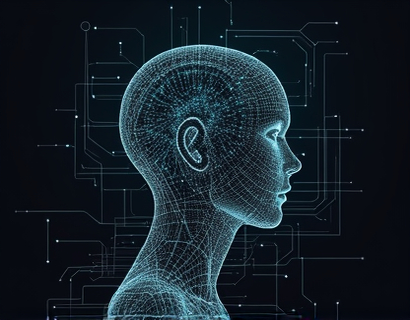Boosting Childhood Creativity and Emotional Health with Personalized AI-Driven Imaginative Companions
In an era where technology is increasingly intertwined with daily life, the potential of Artificial Intelligence (AI) to enhance childhood development is becoming more evident. One innovative approach is the creation of personalized AI-driven imaginative companions designed to boost creativity and emotional health in children. These digital entities are not mere toys but sophisticated tools that adapt to each child's unique needs, fostering a rich and secure environment for growth and exploration.
The concept of using AI to support child development is rooted in the understanding that play is a fundamental aspect of a child's life. Through play, children learn, express themselves, and develop essential skills. Personalized AI companions take this a step further by providing interactive and imaginative play experiences tailored to individual children. This article delves into how these AI-driven companions can enhance creativity and emotional health, offering insights for parents and guardians interested in leveraging technology to support their child's development.
Enhancing Creativity Through Personalized Play
Creativity is a vital component of childhood development, enabling children to think outside the box, solve problems, and express their unique perspectives. Personalized AI companions are designed to stimulate creativity by engaging children in open-ended, imaginative play. Unlike traditional toys that have fixed functions, AI companions can adapt to a child's interests and ideas, creating a dynamic and ever-evolving play environment.
For instance, a child interested in storytelling can collaborate with the AI to create characters, plotlines, and settings. The AI can suggest new elements or twists based on the child's inputs, encouraging them to think creatively and expand their narrative skills. This interactive process not only makes play more engaging but also helps children develop a deeper understanding of storytelling and creative expression.
Supporting Emotional Health with AI Companions
Emotional health is another critical area where AI-driven companions can make a significant impact. Children often struggle to articulate their feelings or may feel overwhelmed by emotions they don't fully understand. Personalized AI companions provide a safe and non-judgmental space for children to explore and express their emotions.
These companions can be programmed to recognize and respond to a child's emotional cues, offering comfort, guidance, and support. For example, if a child is feeling sad or anxious, the AI can initiate a conversation, ask open-ended questions, and provide reassurance. This interaction helps children develop emotional intelligence and learn healthy coping mechanisms.
Building Trust and Security
The relationship between a child and an AI companion is built on trust and security. Unlike human interactions, which can be unpredictable, AI companions offer a consistent and reliable presence. This consistency is particularly beneficial for children who may experience anxiety or uncertainty in their daily lives. The AI's predictable and supportive nature helps children feel safe to express themselves and explore their emotions without fear of judgment or rejection.
Moreover, the digital environment in which these companions operate is carefully designed to be secure and child-friendly. Parents and guardians can rest assured that their children are interacting in a controlled space, free from inappropriate content or interactions. This security fosters a sense of safety, allowing children to be more open and vulnerable in their emotional expressions.
Fostering Social Skills Development
Social skills are essential for a child's success in both personal and professional life. Personalized AI companions can play a role in developing these skills by simulating social interactions and providing opportunities for role-playing. Through these interactions, children can practice communication, empathy, and cooperation in a low-stakes environment.
For example, an AI companion can engage a child in a pretend game where they take on different roles, such as a teacher and a student or a doctor and a patient. These scenarios allow children to practice social cues, understand different perspectives, and develop a sense of empathy. The AI can offer feedback and suggestions to help the child improve their social skills, making the learning process both fun and effective.
Collaborative Play and Peer Interaction
While AI companions provide individualized experiences, they can also facilitate collaborative play and peer interaction. Multiple children can engage with their own AI companions simultaneously, creating a virtual playgroup where they can interact and collaborate on shared activities. This setup not only enhances social skills but also introduces children to the joys of shared play and teamwork.
Teachers and caregivers can also use these AI companions as a tool to facilitate group activities and discussions. By integrating the AI into classroom settings, educators can create engaging and inclusive learning experiences that cater to diverse learning styles and needs.
Personalization and Adaptability
One of the key strengths of AI-driven imaginative companions is their ability to personalize the play experience. Each child is unique, with different interests, abilities, and developmental stages. Personalized AI companions use advanced algorithms to understand and adapt to these individual differences, ensuring that the play experience is always relevant and engaging.
For instance, a younger child might engage in simpler, more visual play scenarios, while an older child might enjoy more complex narrative and problem-solving activities. The AI can seamlessly adjust the complexity and content of the play to match the child's current level, providing a continuous and challenging experience that promotes growth.
Continuous Learning and Improvement
The AI behind these companions is not static; it continuously learns and improves based on interactions with the child. This ongoing learning process allows the AI to refine its understanding of the child's preferences, strengths, and areas for development. Over time, the AI becomes more attuned to the child's needs, offering more tailored and effective support.
Parents and guardians can also benefit from insights provided by the AI, such as reports on the child's play patterns, emotional expressions, and skill development. These insights can help adults better understand their child's progress and identify areas where additional support may be needed.
Creating a Balanced Digital Play Environment
While the benefits of AI-driven imaginative companions are clear, it is essential to maintain a balanced approach to digital play. Over-reliance on technology can have negative effects on a child's development, including reduced physical activity and social interaction. Therefore, it is crucial to integrate these AI companions as part of a diverse and balanced play routine.
Parents and guardians can set guidelines for screen time, ensuring that digital play is complemented by outdoor activities, creative arts, and face-to-face interactions. This balanced approach helps children develop a well-rounded set of skills and prevents the potential downsides of excessive screen time.
Parental Involvement and Guidance
Parental involvement is key to maximizing the benefits of AI-driven imaginative companions. While the AI provides a valuable tool for development, the role of adults in guiding and supporting their children cannot be overstated. Parents and guardians can participate in the play process, asking questions, providing feedback, and engaging in conversations with both the child and the AI.
This active involvement not only strengthens the parent-child bond but also ensures that the AI's suggestions and interactions align with the family's values and educational goals. By being present and engaged, adults can help children navigate the digital world responsibly and ethically.
Conclusion
The integration of personalized AI-driven imaginative companions into childhood development offers a promising future for enhancing creativity and emotional health. These digital companions provide a unique and adaptive play experience that supports individual growth and learning. By fostering imaginative play, building emotional intelligence, and facilitating social skills development, AI companions can be a valuable addition to a child's life.
However, it is important to approach this technology with a balanced and mindful perspective. Parents and guardians play a crucial role in ensuring that digital play complements traditional activities and that children receive the guidance and support they need. With thoughtful implementation, AI-driven imaginative companions can help shape a generation of creative, emotionally resilient, and socially adept individuals.











































